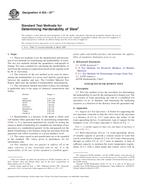1.1 These test methods cover the identification and description of test methods for determining the hardenability of steels. The two test methods include the quantitative end-quench or Jominy Test and a method for calculating the hardenability of steel from the chemical composition based on the original work by M. A. Grossman.
1.2 The selection of the test method to be used for determining the hardenability of a given steel shall be agreed upon between the supplier and user. The Certified Material Test Report shall state the method of hardenability determination.
1.3 The calculation method described in these test methods is applicable only to the range of chemical compositions that follow:
| Element | Range, % | |
|---|---|---|
| Carbon | 0.10–0.70 | |
| Manganese | 0.50–1.65 | |
| Silicon | 0.15–0.60 | |
| Nickel | 1.50 max | |
| Chromium | 1.35 max | |
| Molybdenum | 0.55 max | |
| Copper | 0.35 max | |
| Vanadium | 0.20 max |
1.4 Hardenability is a measure of the depth to which steel will harden when quenched from its austenitizing temperature (Table 1). It is measured quantitatively, usually by noting the extent or depth of hardening of a standard size and shape of test specimen in a standardized quench. In the end-quench test the depth of hardening is the distance along the specimen from the quenched end which correlates to a given hardness level.
1.5 The values stated in inch-pound units are to be regarded as the standard. The values given in parentheses are for information only.
1.6 This standard does not purport to address all of the safety concerns, if any, associated with its use. It is the responsibility of the user of this standard to establish appropriate safety and health practices and determine the applicability of regulatory limitations prior to use.
TABLE 1 Normalizing and Austenitizing TemperaturesA
| Steel Series | Ordered Carbon Content, max, % | Normalizing Temperature, °F (°C) |
Austenitizing Temperature, °F (°C) |
|---|---|---|---|
| 1000, 1300, 1500, 3100, 4000, 4100 | 0.25 and under | 1700 (925) | 1700 (925) |
| 4300, 4400, 4500, 4600, 4700, 5000, 5100, 6100,B 8100, 8600, 8700, 8800, 9400, 9700, 9800 | 0.26 to 0.36, incl | 1650 (900) | 1600 (870) |
| 0.37 and over | 1600 (870) | 1550 (845) | |
| 2300, 2500, 3300, 4800, 9300 | 0.25 and under | 1700 (925) | 1550 (845) |
| 0.26 to 0.36, incl | 1650 (900) | 1500 (815) | |
| 0.37 and over | 1600 (870) | 1475 (800) | |
| 9200 | 0.50 and over | 1650 (900) | 1600 (870) |
A A variation of ±10°F (6°C) from the temperatures in this table is permissible.
B Normalizing and austenitizing temperatures are 50°F (30°C) higher for the 6100 series.
Product Details
- Published:
- 09/01/2007
- Number of Pages:
- 26
- File Size:
- 1 file , 240 KB
- Redline File Size:
- 2 files , 600 KB
